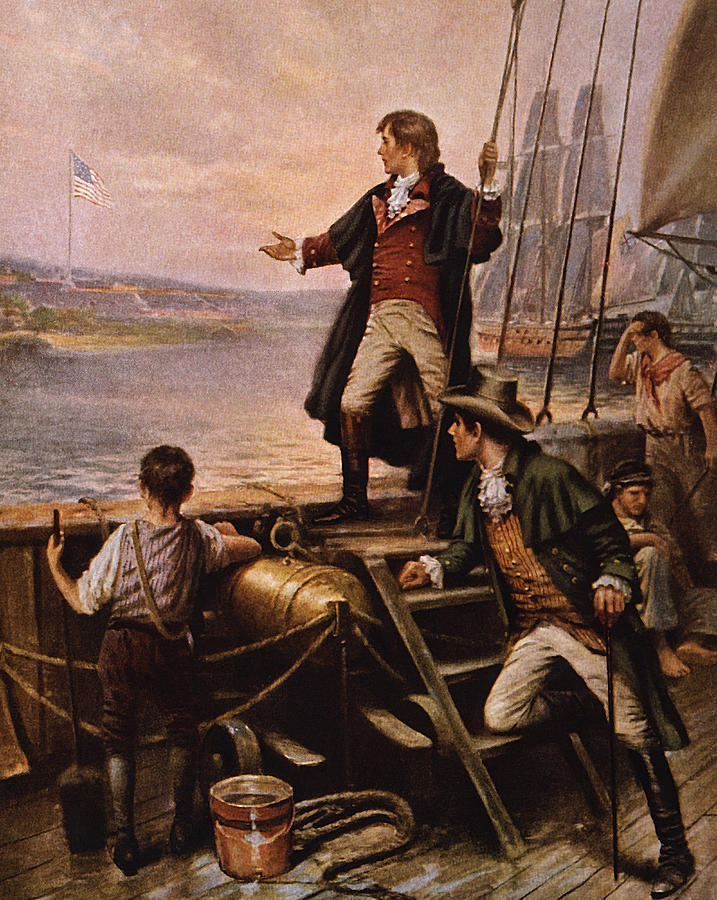The War of 1812
The Classical Period
Smithsonian, CC BY-SA 4.0
During the Napoleonic Wars, the young United States attempted to remain neutral. Since this meant American merchant vessels continued to ship goods and supplies to France, Great Britain began a policy of impressment, attacking American vessels and forcing their captured crews to serve in the Royal Navy. This led the United States to declare war on Great Britain in 1812.
The British, eager to teach their former Colonies a lesson, acted quickly, using their superior navy to blockade American ports. British forces captured and burned Washington DC, forcing Congress and President James Madison to evacuate.
A month later, British forces attempted to sail up Chesapeake Bay and capture Baltimore. The British failed to overtake Fort McHenry, Baltimore's main artillery battery, and withdrew on September 14, 1814. An American lawyer named Francis Scott Key, who witnessed the battle from behind British lines, inspired to see the Americans still held the fort, wrote a poem called The Defense of Fort McHenry:
O say can you see, by the dawn’s early light,
What so proudly we hail’d at the twilight’s last gleaming,
Whose broad stripes and bright stars through the perilous fight
O’er the ramparts we watch’d were so gallantly streaming?
And the rocket’s red glare, the bombs bursting in air,
Gave proof through the night that our flag was still there,
O say does that star-spangled banner yet wave
O’er the land of the free and the home of the brave?On the shore dimly seen through the mists of the deep
Where the foe’s haughty host in dread silence reposes,
What is that which the breeze, o’er the towering steep,
As it fitfully blows, half conceals, half discloses?
Now it catches the gleam of the morning’s first beam,
In full glory reflected now shines in the stream,
’Tis the star-spangled banner! O long may it wave
O’er the land of the free and the home of the brave!And where is that band who so vauntingly swore,
That the havoc of war and the battle’s confusion
A home and a Country should leave us no more?
Their blood has wash’d out their foul footstep’s pollution.
No refuge could save the hireling and slave*
From the terror of flight or the gloom of the grave,
And the star-spangled banner in triumph doth wave
O’er the land of the free and the home of the brave.When our land is illumined by Liberty’s smile,
If a foe from within strikes a blow at her glory,
Down, down with the traitor who dares to defile
The flag of her stars and the page of her story!
By the millions unchained who their birthright have gained,
We will keep her bright blazon forever unstained!
And the Star-Spangled Banner in triumph shall wave
While the land of the free is the home of the brave!O thus be it ever when freemen shall stand
Between their lov’d home and the war’s desolation!
Blest with vict’ry and peace may the heav’n rescued land
Praise the power that hath made and preserv’d us a nation!
Then conquer we must, when our cause it is just,
And this be our motto – “In God is our trust,”
And the star-spangled banner in triumph shall wave
O’er the land of the free and the home of the brave.
Some controversy exists over the line "No refuge could save the hireling and slave." It is true that some enslaved Americans attempted to defect to the British, who promised to free them if they fought against the United States, and it is possible this is to what Key was referring. On the other hand, the entire poem, especially the stanza in question, is a continuous, coherent narrative contrasting the Americans and British; from a purely poetic standpoint, it is unlikely Key switched subjects for a single line. More likely, the phrase is a continued taunt contrasting the free citizens of the American republic with the British, who remained the "slaves" of a tyrant king.
These lyrics were later set to a tune composed by John Stafford Smith called "The Anacreon Song." This was the anthem of the Anacreon Society, a group of amateur musicians in London.
A fifth verse, beginning "When our land is illumined by liberty's smile," was not written by Francis Scott Key, but penned in 1861 by poet Oliver Wendell Holmes, Sr. (his more famous son, Oliver Wendell Holmes, Jr., became a Supreme Court Justice), predicting the end of slavery.
The tune and lyrics together were officially used by the U.S. Navy from 1889 and were declared the national anthem of the United States in 1931.
